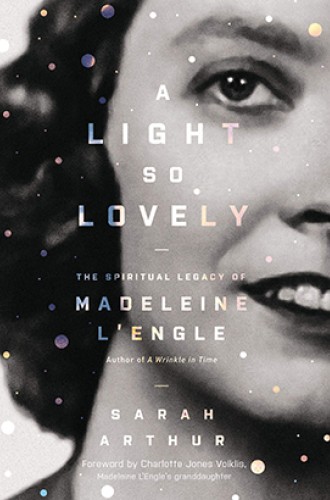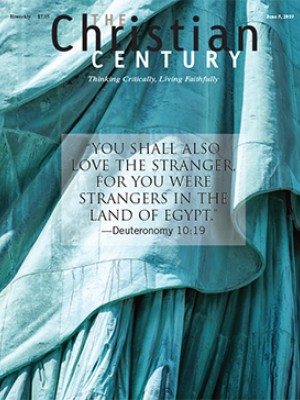Near the end of A Wrinkle in Time, Madeleine L’Engle’s 1962 fantasy novel of adventure and rescue, Mrs. Whatsit, one of the shape-shifting guardian matrons who accompanies the book’s three young protagonists, tells the children that each life is a sonnet and each person is the poet and creator of his or her life: “But within this strict form the poet has complete freedom to say whatever he wants, doesn’t he?” In that theopoetic question lies the seed of L’Engle’s belief in the capacity of narrative to contain changing human experience and developing thought.
In this warm and admiring spiritual biography, published 100 years after L’Engle’s birth, Sarah Arthur paints a picture of an author and mentor to many who kept plots—including the plot of her own life—moving by traversing the literary conventions and traditional boundaries that limited less adventurous writers. For example, although L’Engle had no formal training in theology or science, she explored both fields with passionate interest and held them together in her writing. Arthur writes that L’Engle said often that she had “never seen any conflict between science and religion, because all science can do is enlarge our vision of God.” In lectures and speeches, L’Engle defended the integration of science and faith, art and religion, secular and sacred, fact and fiction.
Read our latest issue or browse back issues.
In the early 1950s, as L’Engle pursued her literary ambition, she moved with her family from New York City, where she and her husband worked in the theater business, to Goshen, Connecticut. From an old farmhouse of “charming confusion,” L’Engle parented her young children, operated a general store, and tried to kick-start her literary career. Early in this spiritually and vocationally unsettled period, she confessed to a Congregational minister that she did not believe in God but she found it impossible to live as if she did not believe in God. In spite of this comment—or perhaps on account of it—the minister asked L’Engle to teach Sunday school.
Seeking Christian understanding for herself and for her students, L’Engle began to ask ultimate questions. Seminary-trained friends suggested that she look for answers in the work of German theologians. Arthur suspects that L’Engle tackled Tillich, Bultmann, and others. L’Engle admitted that the theologians offered answers to the questions she was asking, but, with a smile, she complained that their books bored her to sleep. Their “laboratory-proof, rigid limiting” of God’s nature drove her further from the spiritual assurance she was after.
L’Engle pressed on until she found ideas that would fill her imagination and inspire her writing. Another passage from A Wrinkle in Time could be an epigraph to these years that finally grounded L’Engle’s faith and enlivened her muse. Near the beginning of the book, Meg’s mother, a scientist, responds to her daughter’s confusion about a strange occurrence in the night. Meg wants to dismiss the experience as a dream. Her mother says, “No, Meg. Don’t hope it was a dream. I don’t understand it any more than you do, but one thing I’ve learned is that you don’t have to understand things for them to be.”
First, L’Engle decided to nurture her Christian faith within the community of a congregation. Later in life she wrote, “If I go to services with reasonable regularity, it is largely because I believe that if I am attempting to understand what it means to be a Christian, this cannot be done in lofty isolation. . . . I go to church . . . because I am a hungry sheep who needs to be fed.”
Second, on a cross-country camping trip, L’Engle discovered Albert Einstein, an unlikely guiding star. In the theoretical physicist, she had found her theologian. Einstein had died only a few years earlier, so discussions of his achievements were readily available. L’Engle was thrilled by his theories of matter, time, and space. She allowed Einstein and other scientists, such as physicist Max Planck and astrophysicist Arthur Eddington, to direct “adventures in theology” for her, excursions that led directly to the writing of A Wrinkle in Time. Through the rest of her life, L’Engle repeated her conviction that science and religion both investigate the same great panoply of creation.
Boldly employing scientific ideas and faithfully returning to locally grown biblical Christianity, L’Engle enjoyed the adoration of many fans. Among these were conservative Christian college students who saw her as defending a faith that could love the world even in the evolving terms of science. Certain fellow writers admired how Christian ideas appeared naturally in the course of her stories. L’Engle wrote of her craft: “When we write a story, we must write to the absolute best of our ability. . . . If we are truly Christian, that will also be evident, no matter what the topic. If we are not truly Christian, that will also be evident, no matter how pious the tale.”
Arthur, a widely published author herself, has written not only a biography but also a heartfelt tribute. Informed but informal and familiar in style, the book reads like a memorial address to a gathering of fellow writers who feel as much affection for L’Engle as Arthur does. A more objective tone and a more critical approach—one that kept the emphases on spiritual light and literary gifts—might have been more useful to readers less familiar with L’Engle’s life and work.






